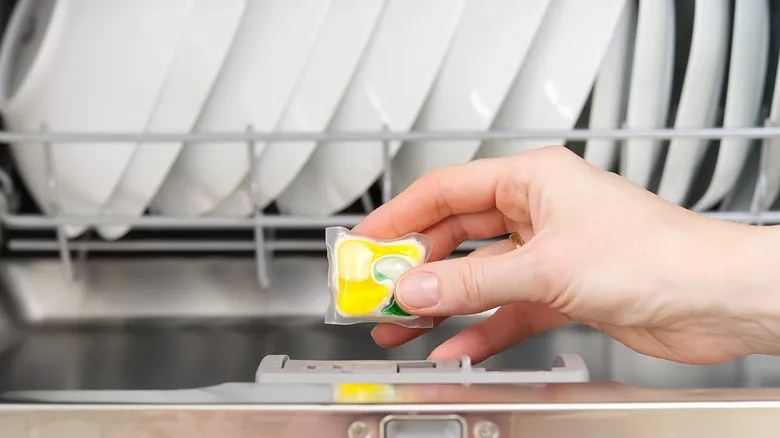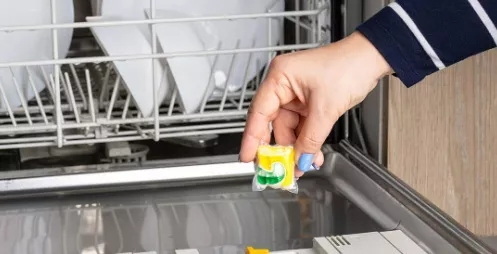Dongguan UFine Daily Chemical Co.,Ltd.
- All
- Product Name
- Product Keyword
- Product Model
- Product Summary
- Product Description
- Multi Field Search
Views: 222 Author: Tomorrow Publish Time: 11-20-2025 Origin: Site











Content Menu
● Understanding How Laundry Pods Work
● The Difference Between Dishwasher and Laundry Detergent
● What Happens If You Use Clothes Pods in a Dishwasher
● Proper Use of Laundry Pods and Dishwasher Detergents
● Safe Alternatives When You Run Out of Dishwasher Detergent
● Why Cross-Using Cleaning Products Is Dangerous
● Environmental and Health Implications
● How to Clean a Dishwasher After Using a Laundry Pod Accidentally
● Tips for Maintaining Dishwasher Efficiency
● How Dishwasher Pods Compare to Other Detergent Forms
● FAQ
>> 1. Can I use laundry pods in my dishwasher just once?
>> 2. What should I do if I accidentally use a laundry pod in my dishwasher?
>> 3. Are dishwasher pods and laundry pods chemically similar?
>> 4. Can I substitute laundry detergent when I run out of dishwasher detergent?
>> 5. Does dishwasher detergent contain bleach?
The convenience of modern cleaning products has led many people to wonder if laundry pods and dishwashers can be used interchangeably. After all, both appliances use water, heat, and detergent to clean. While this might seem practical in a pinch, using laundry pods in a dishwasher can actually cause significant issues—from damaging the appliance to leaving toxic residues on dishes.
This article explains why laundry pods should never be used in dishwashers, what can happen if you try, and the right alternatives for safe, effective dish cleaning.

Laundry pods are small, pre-measured packets designed specifically to wash fabrics, not dishes. They contain a combination of surfactants, enzymes, fragrances, and sometimes softening agents. These ingredients break down oils and debris found in clothing fibers but are not safe for surfaces that come in contact with food.
When dissolved in water, the pod releases detergent optimized for fabric penetration and stain lifting. However, the chemical balance, sudsing agents, and perfumes in laundry pods differ drastically from those in dishwasher detergents. This makes laundry pods incompatible with dishwashers at a chemical and mechanical level.
At first glance, both detergents seem similar—they clean items using water and heat. But their compositions serve entirely different purposes.
- Dishwasher detergent is formulated to remove food particles, grease, and oils without producing excess foam. It often includes rinse aids and anti-spotting agents, ensuring sparkling, residue-free dishes.
- Laundry pods, meanwhile, are formulated to create suds that agitate clothes for deeper cleaning. They also contain perfumes and softeners that would be harmful or leave residues on dish surfaces.
The pH levels, types of surfactants, presence of bleach, enzymes, and additives are significantly different. Dishwasher detergents typically use harsher surfactants and sometimes chlorine bleach for breaking down tough food stains, while laundry detergents use enzymes to target protein, starch, and fat stains on fabrics. The sudsing agents in laundry pods cause excessive foam, which a dishwasher is not designed to handle.[1][2]
Using a laundry pod in your dishwasher can create multiple problems, some of which may be irreversible. Here's what typically happens:
1. Excessive Sudsing: Laundry pods produce high foam levels that dishwashers cannot handle. The overflow can leak from the door, flood the kitchen floor, and even short-circuit electronic components.
2. Sticky or Oily Residue: The surfactants and perfumes in laundry pods may leave sticky residues on dishes, especially glass and metal. These residues are unsafe for use with food and can cause unpleasant tastes or smells.
3. Health Hazards: Laundry detergent contains chemicals that are not FDA-approved for contact with food. These compounds can transfer onto utensils and plates, posing risks of ingestion and irritation.
4. Appliance Damage: The thick foam can clog the pump, filters, and sensors inside the dishwasher. Repeated misuse may cause corrosion or malfunction, requiring costly repairs.
Even a single misuse can cause lasting damage or contamination that affects subsequent dishwashing cycles.[4][6]
Each detergent type serves a unique purpose. Always follow manufacturer instructions for both laundry and dishwashing products:
- Laundry pods: Place them directly into the washing drum — not in detergent drawers — for optimal fabric cleaning.
- Dishwasher detergents: Use only commercial dishwasher pods, powders, or gels. These dissolve under controlled sudsing conditions and are food-safe.
- Avoid substitutions: If dishwasher detergent runs out, hand-wash dishes using mild dish soap and warm water instead of improvising with laundry products.
Using each product as intended protects your appliances and ensures hygienic cleaning results.
If you find yourself without dishwasher detergent, there are safe, short-term alternatives that can work in an emergency, though not recommended for regular use:
- Baking soda and vinegar: Add one tablespoon of baking soda to the detergent compartment and place a cup of vinegar on the top rack. This breaks down grease and odors.
- Lemon juice: The natural acidity acts as a mild degreaser and brightens glassware.
- Minimal dish soap: Use only a drop or two of mild dishwashing liquid combined with baking soda, to avoid excessive sudsing.
Return to proper dishwasher detergent promptly to avoid residue buildup or appliance damage.[4]

Cleaning products are tailored to specific surfaces and soil types. Dish detergents are designed for hard, nonporous surfaces used for food, while laundry detergents are optimized for fabrics. Their chemicals, pH levels, and sudsing behaviors differ significantly. Misusing one for the other risks chemical exposure, appliance failure, and contamination.
This concept applies not only to detergents but across cleaning products used in various appliances like coffee makers or washing machines.[2][9]
Laundry pods often include concentrated chemicals, fragrances, and polymers meant for fabrics, not food contact surfaces. If residues from laundry pods remain on dishes, they can cause allergic reactions or skin irritation when utensils or plates are used.
Additionally, excess suds can overwhelm plumbing or water treatment systems. Choosing the right detergent minimizes environmental impacts and helps ensure dishware safety.[1]
If a laundry pod is accidentally used in a dishwasher, follow these steps:
1. Immediately stop the dishwasher cycle to prevent overflow.
2. Manually remove suds with towels or a wet vacuum.
3. Run an empty rinse cycle with a cup of white vinegar to help break down residues.
4. Clean the dishwasher seals, filters, and spray arms thoroughly.
5. Run a full cycle with approved dishwasher detergent to restore normal function.
This prevents residue buildup and potential mechanical damage.[4]
Proper detergent use is only one part of dishwasher upkeep. For optimal performance:
- Clean the dishwasher filter every two weeks to prevent clogging.
- Use rinse aids to reduce water spots on dishes.
- Check spray arms for blockages regularly.
- Run a monthly cleaning cycle using dishwasher cleaner or vinegar.
These maintenance steps improve cleaning results and extend appliance lifespan.[3]
Dishwasher pods offer pre-measured convenience and concentrated cleaning power. Compared to liquids, pods reduce detergent waste but can sometimes leave residue if the pod does not dissolve fully.
Powder detergents often contain both enzymes and bleach, providing a balanced, effective clean that liquid detergents struggle to match due to ingredient incompatibilities.
Choosing pods or powders depends on user preference, but liquid dishwasher detergents typically offer gentler options for delicate dishes at a slightly lower cleaning efficacy.[5][3]
Using clothes pods in your dishwasher is a hazardous mistake. Laundry pods are chemically designed for fabrics, not food-contact surfaces, and cause excessive sudsing, residues, health risks, and damage to your dishwasher.
Always use products as intended: laundry pods for clothes, dishwasher detergent for dishes. Proper use safeguards your appliances and household health, ensuring clean, safe dishes every time.

No. Even a single use can cause sudsing overflow, mechanical damage, and unsafe residues on dishes.
Stop the cycle, remove suds, then perform rinse and cleaning cycles with vinegar and approved dishwasher detergent.
No. They have different pH levels, surfactants, enzymes, and additives designed specifically for dishes or fabrics.
No. Use safe alternatives like baking soda and vinegar or minimal dish soap only temporarily, not laundry detergent.
Many dishwasher detergents do contain bleach or oxygen-based compounds, which are not in laundry pods, helping break down tough food stains.
[1](https://neatex.co.uk/blog/washing-liquid-or-dishwashing-liquid-which-one-is-better/)
[2](https://news.wisc.edu/curiosities-whats-the-difference-between-dishwasher-detergent-laundry-detergent-and-dish-soap-why-arent-they-interchangeable/)
[3](https://www.townappliance.com/blogs/town-appliance-official/dishwasher-pods-vs-liquid-detergent)
[4](https://yeserchem.com/should-you-use-dishwashing-liquid-as-laundry-detergent/)
[5](https://www.nytimes.com/wirecutter/reviews/advice-dishwasher-pods-vs-liquid/)
[6](https://www.reddit.com/r/explainlikeimfive/comments/2b9fug/eli5_whats_the_difference_between_laundry/)
[7](https://www.facebook.com/groups/thedullclub/posts/2404274999777605/)
[8](https://www.ahs.com/home-matters/cost-savers/the-detergent-duel-solid-vs-liquid/)
[9](https://www.reddit.com/r/explainlikeimfive/comments/k2n08d/eli5_whats_the_difference_between_soap_you_use/)
[10](https://www.dropps.com/blogs/spincycle/can-you-use-laundry-detergent-to-wash-dishes)